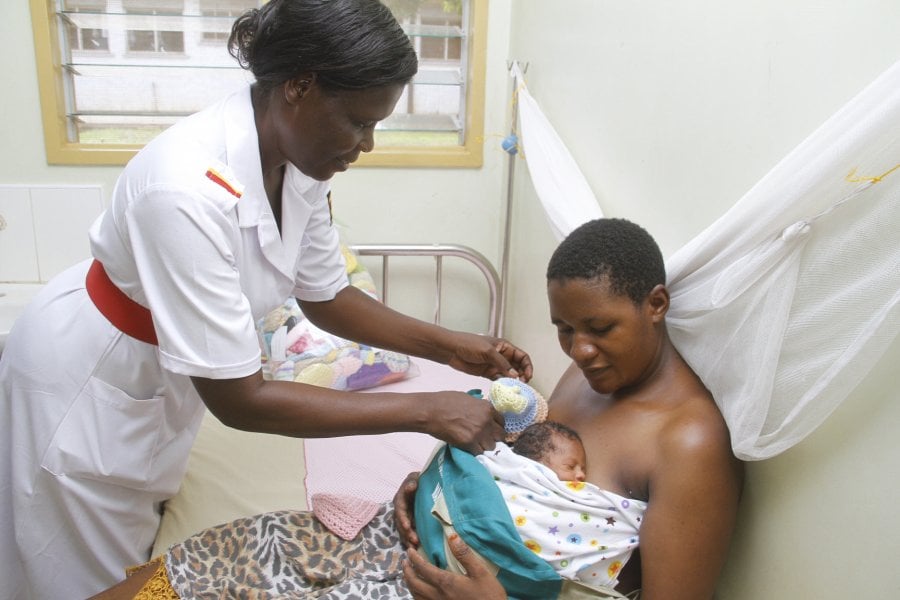
Kangaroo Mother Care_OMWaNA jpeg
In collaboration with the Ministry of Health, the MRC/UVRI and LSHTM Uganda Research Unit convened a high-level stakeholder workshop aimed at accelerating progress in neonatal survival in Uganda. The three-day event, held at Kabira Country resort in Kampala, brought together national and global policymakers, researchers, and funders to discuss new research evidence and investment opportunities emerging from the OMWaNA study trial, which have the potential to propel the national health system closer to the attainment of its goals such: as reducing the neonatal mortality rate to at least 12 per 1000 live births, mitigating under 28 days mortality rate by half of the current 33,000 deaths by 2030 and tackling preventable conditions such as birth asphyxia and neonatal sepsis as laid up in the Uganda Health Sector Development Plan 2019-2020 and the National Development Plan 4.
A collaborative, evidence-based research study
Professor Joy Lawn, Director of the Maternal, Adolescent, Reproductive & Child Health (MARCH) Centre at the London School of Hygiene & Tropical Medicine and Principal Investigator of the OMWaNA trial, delivered a keynote address on accelerating neonatal survival. Drawing from global successes, Professor Lawn emphasized the importance of strategic investments and robust collaboration among government bodies, international organizations, and the private sector. She advocated for the establishment of functional small and sick newborn care units nationwide, equipped with facilities to support Kangaroo Mother Care (KMC) implementation, a method of care for preterm infants that involves infants being carried by their mothers with skin-to-skin contact, and respiratory support for preterm newborns.
Dr. Victor Tumukunde and Dr. Melissa Medvedev, Co-Principal Investigators on the OMWaNA study, presented compelling evidence on the economic benefits and impact of Kangaroo Mother Care for vulnerable and unstable neonates. Their findings demonstrated that initiating Kangaroo Mother Care before stabilization is cost-effective from both societal and provider perspectives compared to standard care. This evidence underpins the strategic push for integrating Kangaroo Mother Care into neonatal care protocols across Uganda.
Winning government buy-in
Hon. Margaret Muhanga, State Minister for Primary Healthcare, lauded the Newborn Investment Case as a strategic financial blueprint for mobilizing resources to improve neonatal outcomes. She highlighted the necessity of grounding decisions in robust research findings, such as those from the OMWaNA trial, to enhance care for preterm babies.
"We need to consider new evidence in caring for newborns in Uganda. For example, the OMWaNA trial showed us that Kangaroo Mother Care before stabilization is a cost-effective intervention for caring for preterm babies," she emphasized.
Building a nation-wide investment case
Break-out discussions helped to formulate actionable plans on critical areas such as infrastructure, human resources, data management, and medical commodities for the care of small and sick newborns. The discussions culminated in the co-development of a comprehensive investment case for neonatal care in Uganda, which can serve as a blueprint for increasing investments nationwide. Technical working groups were formed to follow up on strategic government commitments to develop neonatal nurses’ training curriculum and recruitment needs, optimization of neonatal care units, data systems and increased access to essential commodities for case of small and sick neonates.As the Unit and its partners move forward, the collaborative strategies and evidence-based approaches developed during this event will play a crucial role in shaping the future of neonatal care in Uganda.
About the OMWaNA trial
The OMWaNA trial aimed to assess the effectiveness of KMC in reducing mortality among neonates before stabilisation, a vulnerable population for whom its benefits are uncertain. The trial improved understanding of pathways underlying the intervention’s effects and is among the first to rigorously compare the incremental cost and cost-effectiveness of KMC relative to standard care. The study is located in the Units Non Communicable Diseases (NCD) research theme.
Learn more about the NCD Research theme
If you enjoyed this article and would like to build a career in global health, we offer a range of MSc programmes covering health and data, infectious and tropical diseases, population health, and public health and policy.
Available on campus or online, including flexible study that works around your work and home life, be part of a global community at the UK's no.1 public health university.
